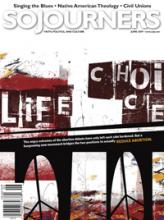The blues make an ideal soundtrack for these days of economic angst and turmoil. Who couldn’t find solace in a song like “Rollin’ and Tumblin,’” “I Be’s Troubled,” or “Hellhound on My Trail”? The blues can also articulate our deepest suffering as broken humans in need of redemption, says Stephen J. Nichols, professor of Christianity and culture at Lancaster (Pennsylvania) Bible College and author of Getting the Blues: What Blues Music Teaches Us about Suffering and Salvation. He talked with Sojourners associate editor Molly Marsh about the theological story contained in the blues.
Molly Marsh: How do you define the blues?
Steve Nichols: I was down in the Mississippi Delta staying at an amazing place called the Hopson Plantation, and I met blues man Johnnie Billington. I’d been all over the Delta, talked to a number of blues musicians, and I put the same question to all of them—what is the blues?—and his answer was wonderful: “Blues is truth.” That’s a great insight. I think what he’s saying is that it speaks truthfully to human experience. He also said the blues is community—you could be feeling bad, you just lost your job, problems at home—and you go to the blues bar and here’s a guy up there singing, and he’s got it just as bad as you do. You realize that you’re in this thing together.
You write that “blues is a theology that lingers over Good Friday,” and that many American Christians—evangelicals particularly—may be missing out on a fuller view of humanity, that we’re anxious to slide toward Easter but not dwell in Good Friday.
Read the Full Article
